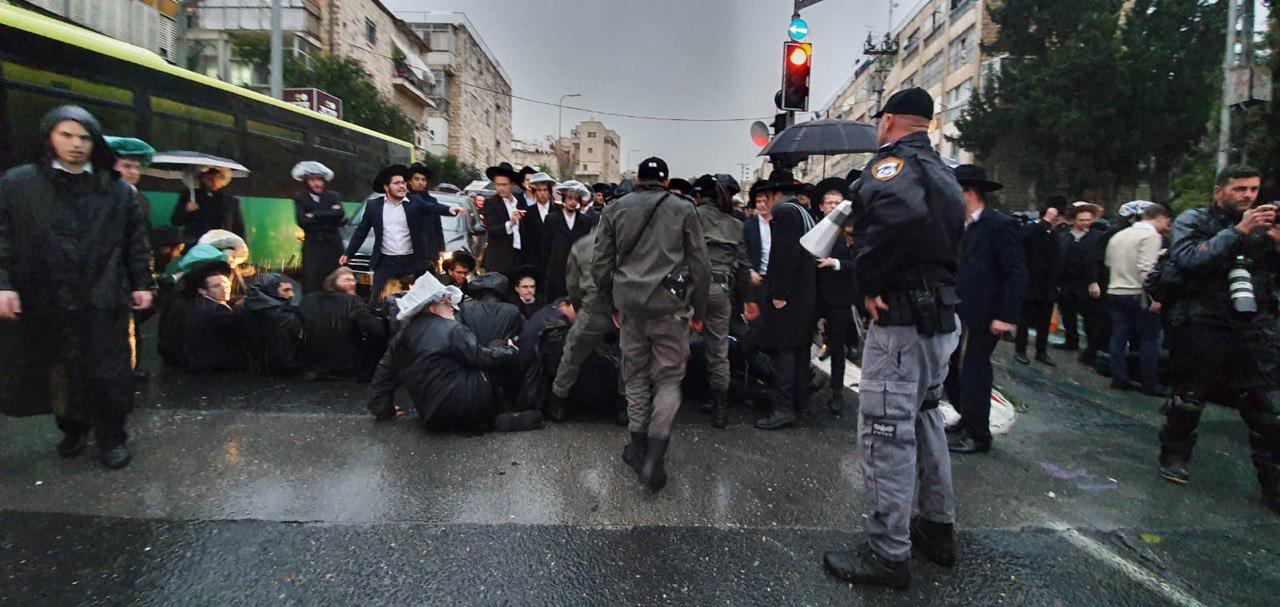It is useless to lambaste the police over the poor enforcement of coronavirus restrictions in the ultra-Orthodox sector.
These violations and mass gatherings are done intentionally and passionately by various parts of the community, with the backing and encouragement of their senior rabbis, both out of a sense of moral and religious supremacy and as a provocation against the secular state.
4 View gallery


Ultra-Orthodox protesters clash with police in Jerusalem over lockdown rules
(Photo: AFP)
True enforcement is not realistic since the police would have to spread their forces to the point of collapse and use means which are questionable in democratic countries.
The enforcement of lockdown rules is not only difficult in the Haredi sector, but also within the Arab community, among anti-government protesters and for those who just want to chill at the beach.
However, in these other instances, it is mainly violations by a handful of people who have no backing from local leaders, and causing a parallel morbidity rate.
The ultra-Orthodox community, however, is the sector with the highest number of COVID patients, by a wide margin. According to data released Tuesday, nearly half of all elderly coronavirus patients are ultra-Orthodox.
The spread of the infection within the community was not deliberate, but happened due to hubris and a complete disregard of reality that were legitimized by senior religious leaders.
Lockdown violations in Jerusalem and Modi'in Illit during Sukkot
(Photo: Gilad Cohen, Haim Goldich)
As a result, not only are the ultra-Orthodox paying the price for their irresponsible conduct, but the whole public as well, in more than one sense.
The government and law enforcement authorities find themselves helpless in the face of this phenomenon, and every sensible person knows this behavior has to be curtailed, but how?
There is one option yet to be tested that might work to change the behavior in the Haredi community without the need for lockdown, curfews or aggressive policing.
The answer could be economic sanctions. A selective and gradual withdraw of the billions of shekels in annual state-funded aid and subsidies to the community's institutions: yeshivas, kollels, bible study groups and even synagogues and publicly-funded mikvahs.
Any rabbi and his flock, Hasidic movement or yeshiva violating coronavirus rules would be denied their public funding.
4 View gallery


A synagogue in the settlement of Beitar Illit violating health regulations during the pandemic
(Photo: Shalev Shalom)
The government has a moral right and a duty to lever this support to limit this rebellious behavior or at least present the Haredi authorities with a very real dilemma.
To this day, the community has behaved as it pleases, while ignoring the government and the general public. If the flow of money stops, they and their leaders will have to think twice.
Mass gatherings at yeshivas or synagogues, for example, would lead to a partial reduction in funding for those institutions.
And if those violations did continue, the whole budget could be cut.
In extreme cases, the sanctions could become more personal. A yeshiva student violating coronavirus rules would lose part or all of his state stipend, a fine that would prove far more effective than any police ticket.
Among the rebellious members of the Haredi community there are also many movements, Hasidic Jews and institutions that do not receive state funding, so what about them?
In such cases, the sanctions can target money donated from abroad. Such an effort could prove to be technically challenging, but its sheer existence would be an effective deterrent.
Some might point out the secular Jews violating restrictions, who attend illicit parties or head to the beach with their friends and family and ask whether they too would lose their state-dunded child benefits and tax rebates.
If the current reality and contagion rates were different, it could be a possibility. But the infection rate among the ultra-Orthodox is far more widespread and dangerous.
4 View gallery


Defense Minister Benny Gantz and Prime Minister Benjamin Netanyahu
(Photo: Tal Shahar)
I am not naïve. I know that such a measure has many legal and constitutional hurdles and mainly political interest to traverse. I am also very aware that from the viewpoint of both Prime Minister Benjamin Netanyahu and Defense Minister Benny Gantz, such sanctions are tantamount to political suicide.
But the pandemic is not even close to ending and we must keep such sanctions in our pocket.
These measures could prove a non-violent solution to many other challenges among the ultra-Orthodox community's more rebellious sectors, such as enlistment in the military.
Israel can no longer bear the legal burden and the lack of governance stemming from the autonomy felt by many parts of the community's more radical members - and even by those less extreme.
Economic sanctions could prove to be an effective and less painful method of resolving this problem.




